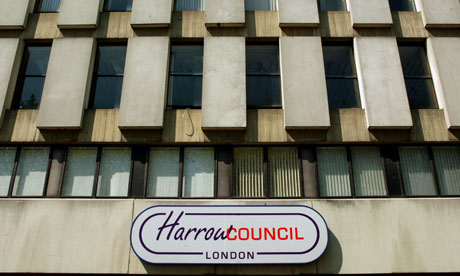Increasing numbers of households struggling with debts such as unpaid council tax will face the extra burden of rising fees levied on them by bailiffs after moves by councils to make more money from debt collection companies, according to bailiffs and advocates for vulnerable debtors.
The north-west London borough of Harrow expects to make £1m by making bailiffs hand over 8% of their fees. Other councils, under pressure to cope with austerity-driven cutbacks, are understood to be considering similar profit-sharing arrangements.
The move has been condemned by bailiff companies and by advocates for debt relief, who claim that it will lead to bailiffs pushing up fees and pursuing vulnerable people even more vociferously in an effort to maintain profits.
"It's going to create the level of competition that I don't believe should be created in an industry that has to deal with vulnerable people," said Jamie Waller, a bailiff and the founder of the JBW Group.
John Kruse, a leading expert on bailiff law in the UK, who also works for Citizens Advice in east London, agreed that the financial burden would be shouldered by vulnerable debtors. "What some of the more image-aware members of the sector are saying is that if bailiffs are asked to pay money to councils then that has to come from somewhere and the way it is going to be produced will be by bailiffs upping the fees that they are charging or being more aggressive about the way they chase people," he said. "The amounts that they collect at the moment are fees that they are allowed to collect by statute. That's their profit, so if the council is saying, 'We want to cut that profit now,' then it's either a case of the bailiffs making less money, which is unlikely, or they collect more money one way or another."
Fern Silverio, the divisional director of collections and housing benefits at Harrow council, told a conference of bailiffs this year: "Councils will be under pressure to find more income streams, and on a big contract covering all debt the bailiff can still make an enormous profit. [Harrow] council will pass debts worth around £10m to our bailiff partners. From that, they should expect to collect between £3m and £4m, which should generate fees of more than £1m."
Harrow plans to introduce competition after its debt recovery contract – including parking, council tax and housing benefit overpayment – comes up for re-tender. Two firms will start with 50% of the work, but one's share may increase if it outperforms the other.
A spokeswoman for Harrow council said that the evaluation of the last contract was weighted in favour of low fees being charged. "The contract evaluation took points away if the fees that the bailiffs were going to charge debtors for certain recovery actions were higher than their competitors," she added.
Kruse said a number of councils in East Anglia were requesting a "return" of 0.5% on revenue collected by the agencies acting for them. Several other local authorities have also been asking for a share of the fees levied on debtors, claim bailiffs. However, the suggestion that bailiffs will have no choice but to raise fees as a result may be controversial, given the significant profits that many of the large firms have enjoyed recently.
Five major bailiff companies last year enjoyed combined revenues of more than £60m, according to a Sunday Times report last month.
Fees can mount up quickly. In the case of unpaid council tax, debtors can find themselves being hit with fees of around £20 for the first and second visits. The fees can then run into the hundreds when bailiffs arrive to seize goods, with bills being levied for waiting time and vehicle hire.
"If it continues to happen I can see grave consequences not just for the debtors but for the industry as a whole because it promotes the wrong sort of activity," said Waller. Larger bailiff companies, and many of their critics, are united in warning of a need for the government to introduce long-promised updated regulations for the industry.
Austin Mitchell, a Labour MP who has campaigned on the issue, said it had the makings of a major scandal. "The industry needs an ombudsman, an effective independent regulator. Otherwise malpractice is going to flourish," he said. "Like the constant pattern of phantom visits where they are charging for visiting people and putting notes through a letter box to say they have – but just not doing it. Then there is the scale of the charges, which are ludicrous in many cases. The methods of operation and abuses all require an independent regulator."
The business can be very profitable with a handful of firms generating more than £1m in profits annually.
The government promised to protect "against aggressive bailiffs and unreasonable charting orders". But plans to begin consultations on new regulations in October were shelved.
Many in the industry, as well as other commentators, suggest that ideological opposition to the creation of new quangos or new "red tape" has led to a rethink. The Ministry of Justice said: "The government is clear that aggressive bailiff activity is completely unacceptable and is committed to bringing forward effective proposals which protect the public. We will announce the details of these measures in due course."
